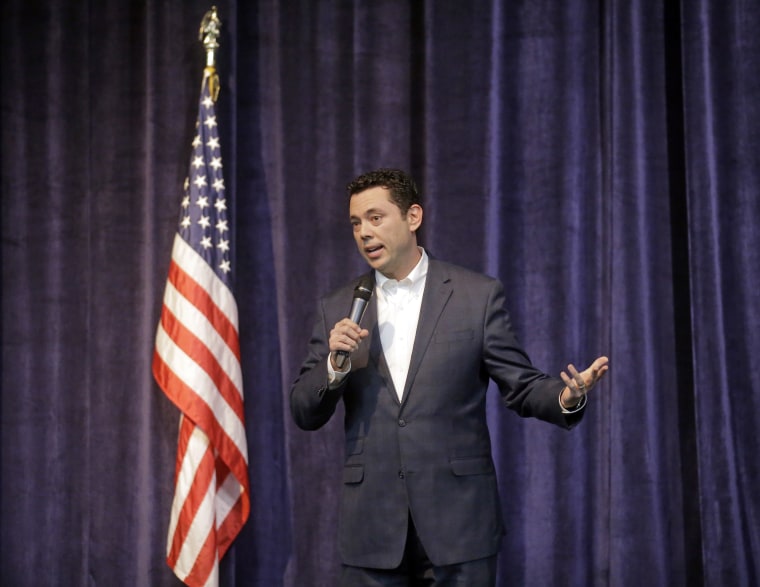Former North Carolina Gov. Pat McCrory (R), the only incumbent governor in either party to lose in 2016, is apparently trying his hand at becoming a Republican pundit. McCrory appeared on "Meet the Press," and even tried to legitimize one of his party's most ridiculous talking points.Reflecting on the wave of progressive activism across the country, the North Carolinian
declared, "It takes money to coordinate these protests.""No it doesn't," MSNBC's Greta Van Susteren
said, without missing a beat. "It takes the internet."The absurdities of the "paid protestor" argument notwithstanding, Republicans can't seem to let go of the idea. Last week, Rep. Jason Chaffetz (R-Utah), who represents one of the reddest districts in the country, faced
a fierce audience, which wasn't at all pleased with recent developments in D.C. As KSL, the NBC affiliate in Salt Lake City,
reported, the Utah Republican has decided to respond to the public pushback by questioning his audience's integrity.
Rep. Jason Chaffetz said the raucous reception he received at Thursday evening's town hall meeting was "bullying and an attempt at intimidation" from a crowd opposed to President Donald Trump's election.... Chaffetz said the crowd that filled the auditorium at Brighton High School in Cottonwood Heights and spilled over into a protest outside included people brought in from other states to disrupt the meeting."Absolutely. I know there were," he said, suggesting it was "more of a paid attempt to bully and intimidate" than a reflection of the feelings of his 3rd District constituents.
So far, Chaffetz has offered no proof to substantiate his suspicions, and any time a member of Congress responds to public pressure by insulting his or her own constituents, there's an inherent risk, even in a safe, lopsided district. (If he can't prove allegations like these, Chaffetz really ought to apologize for questioning these voters' integrity like this.)But I also think this ties into a larger problem related to political responses to public opinion.Last week, for example, Donald Trump said every poll that offers results he doesn't like
must be dismissed as "fake news," practically by definition. Similarly, the White House is convinced that every participant in every anti-Trump protest
must be getting paid by one of his enemies.Sure, this is paranoid. Yes, it's unsubstantiated nonsense. But it's also an unhealthy approach towards understanding public engagement. An inherent "heads I win, tails you lose" dynamic is starting to kick in: too many Republicans are working from the assumption that receptive audiences are "real," while hostile audiences -- like Trump's unflattering polls -- are "fake."When a GOP member of Congress receives a warm reception, he assumes, "The people must be with me." When he confronts angry voters, he assumes, "These people must be part of a corrupt scheme -- because the people are with me."Vox's Dylan Matthews a
good piece on this a couple of weeks ago, focused largely on polling:
[O]ne of the most important checks on the president, on any politician, is public opinion. While it may not always feel true, political scientists broadly agree that presidents have historically been quite responsive to public opinion.... Public opinion is a valuable constraint on the president's freedom of action. [...][I]f Trump does dismiss these numbers, that means he's ignoring one of the only things that can hold him back. Instead of taking polls as indicators -- imperfect indicators, but still -- that something is going wrong and he might want to pivot for his own good, he might not consider them at all.
All of this applies equally well to Chaffetz and his Capitol Hill colleagues. Public backlashes are supposed to make an impression on elected officials whose jobs are dependent on public support. Note, for example, what happened when congressional Republicans tried to start the new year by gutting their own ethics laws: voters howled, and members quickly reversed course, which is how the system is generally supposed to work.Once office-holders start assuming that every critic is part of a nefarious and insincere partisan game, the checks start to break down, and the pivots towards mainstream policymaking become far less likely. That's not a healthy approach to democratic politics.
